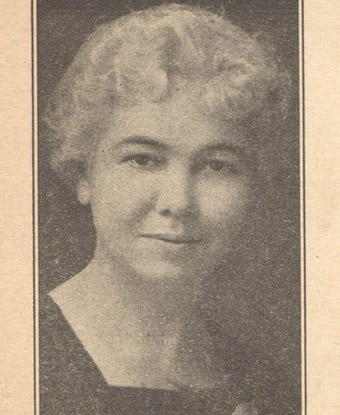Last updated: April 12, 2021
Person
Cora Reynolds Anderson

Cora, a member of the Ojibwa tribe, was born in L'Anse, Michigan. She attended public schools in Michigan’s Upper Peninsula before attending the Haskell Institute in Lawrence, Kansas where she received her teacher’s diploma.[1] After graduating, she returned to Michigan, and taught school at the Zeba Mission in the Upper Peninsula for many years.[2] In 1903, she married Charles Anderson and the couple ran a hotel in L’Anse, Michigan, county seat of Baraga County.
Throughout her adult life, she was interested in improving the lives of those less fortunate, and had particular interest in public health. Before 1925, she organized the first public health service in Baraga County, bringing the first public health nurse to the region.
In 1925, Anderson ran for the Michigan House of Representatives, and won.[3] She was the first woman elected to the Michigan House of Representatives and the first Native American woman to serve in a state legislature. She represented Baraga, Iron, Keweenaw, and Ontonagon Counties. She served one term from 1925 to 1926, losing her seat to a redistricting. While in office, Anderson was appointed the chair of the committee overseeing the Industrial Home for Girls, and sat on the committees for Agriculture, Insurance, and the Northern State Normal School (now Northern Michigan University). She continued promoting public health, fighting against alcoholism and tuberculosis. She also championed the fight to recognize Native American fishing rights on Huron Bay.
After her government service, she became active with the Michigan Grange, serving as the representative for the Upper Peninsula.
In recognizing her contributions in 2001, the Michigan Women’s Hall of Fame wrote, “At a time when minorities, including Native Americans, were subjected to considerable economic and social discrimination, Anderson’s determination to attend college and return the benefits of her education to her community was notable. Her role as educator, legislator, and public health reform leader aided the Native American community as well as the whole of society.”
She died in 1950. Her burial location is unknown.
Notes:
[1] The Haskell Institute, now the Haskell Indian Nations University, was added to the National Register of Historic Places on October 15, 1966 and designated a National Historic Landmarks District on July 4, 1961.
[2] The Zeba Indian Mission United Methodist Church (also known as the Zeba Indian United Methodist Church) at 227 Front Street, Zeba, Michigan was added to the National Register of Historic Properties on April 10, 1980.
[3] The Michigan State Capitol, Lansing, Michigan was added to the National Register of Historic Places on January 25, 1971 and designated a National Historic Landmark on October 5, 1992.
Sources:
Center for American Women and Politics. “Milestones for Women in American Politics,” Center for American Women and Politics, Rutgers University.
French, Amy “Cora Reynolds Anderson,” Women Who Dared, June 8, 2014.
Harrison, Jon. Michigan State University Libraries, “November 2, 1924: Cora Reynolds, First Woman and Only Native American Woman Elected to House,” November 2, 2017.
Michigan Women’s Historical Center and Hall of Fame. “Cora Reynolds Anderson (1882-1950),” Michigan Women’s Hall of Fame.
Mining Journal. “Cora Reynolds Anderson was a Pioneer, Trailblazer.” Mining Journal, December 13, 2016.
